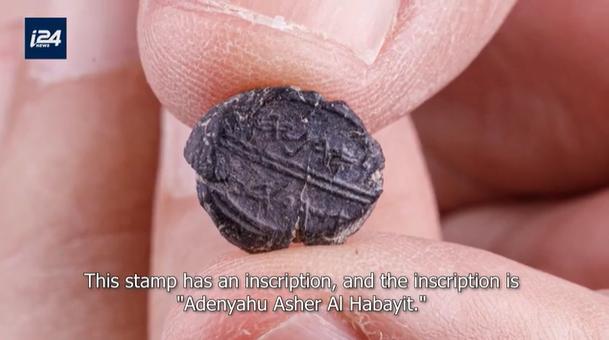 JERUSALEM — A clay seal dating to the time of the first temple and King Solomon has been found in soil excavated from foundations of the Western Wall. The bulla bears the phrase “Adoniyahu Asher Al Habayit,” signifying that the man was a royal steward and was named Adoniyahu, which means “My Lord is Yahweh.”
JERUSALEM — A clay seal dating to the time of the first temple and King Solomon has been found in soil excavated from foundations of the Western Wall. The bulla bears the phrase “Adoniyahu Asher Al Habayit,” signifying that the man was a royal steward and was named Adoniyahu, which means “My Lord is Yahweh.”
“This tiny bulla has immense meaning to billions of people worldwide,” Doron Spielman, vice-president of the City of David Foundation, said in a statement. “[It is] the personal signet of a senior official to a biblical king from the First Temple Period. This is another link in the long chain of Jewish history in Jerusalem that is being uncovered and preserved at the City of David on a daily basis.”
The stamping seal, which is only a centimeter in diameter, was found by a volunteer with the City of David sifting project three weeks ago.
In a video outlining the project, archaeologist Eli Shukron explained that that the inscription on the bulla denotes that Adoniyahu was a “most senior minister in the kingdom of Judah.”
“It is the most closely related minister to the king,” he said.
It was also noted that the name appears in the Bible in several locations, as the English version of Adoniyahu is Adonijah.
“He appears in connection with three [individuals] we know in the Bible, the most famous of which is Adonijah, the son of David,” Shukron stated. Adonijah would also be the half-brother of King Solomon.
His name appears repeatedly in 1 Kings 1 and 2, with one verse chronicling, “And it was told Solomon, saying, ‘Behold, Adonijah feareth King Solomon. For, lo, he hath caught hold on the horns of the altar, saying, ‘Let king Solomon swear unto me today that he will not slay his servant with the sword.'” Solomon later had Adonijah killed, for he sought to usurp the throne.
It is not known whether the bulla belongs to David’s son or if it was the possession of a different royal steward of the name Adoniyahu.
According to The Times of Israel, another seal was found in March that bore the inscription “Nathan-Melech, servant of the king.” The name is found in 2 Kings 23:11, which reads, “And he took away the horses that the kings of Judah had given to the sun, at the entering in of the house of the Lord, by the chamber of Nathan-melech the chamberlain, which was in the suburbs, and burned the chariots of the sun with fire.”
Shukron expressed excitement over the recent find, stating, “[Y]ou come and hold this stamp that was used to sign a letter 2,600 years ago by the most senior minister in the kingdom — it’s something amazing, breathtaking.”
Become a Christian News Network Supporter...


